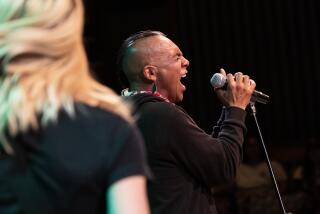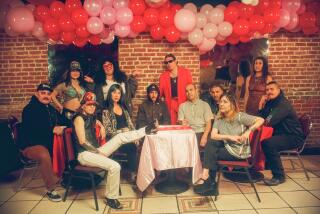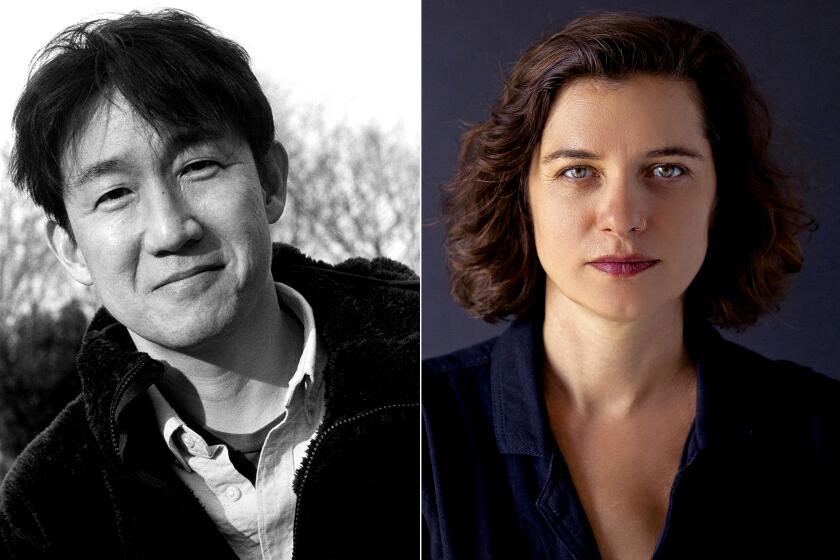Joachim Cooder is on the lead track
Late last year, Joachim Cooder began feeling that life as a sideman wasn’t enough.
Cooder is the son of one of the most lauded names in L.A. rock — singer-guitarist Ry Cooder. For years he played drums for his father, Mavis Staples,Dr. John and the Cuban collective Buena Vista Social Club while composing for indie films like “Lars and the Real Girl.” His life was the archetype of a successful behind-the-scenes musical mercenary .
But late last year during a hobbyist’s stint as an apprentice chef at the downtown L.A. pop-up restaurant Le Comptoir, he began to suspect that new challenges might be good for him musically as well.
“I got thrown in the fire. Everyone there thought I knew so much more than I actually did,” the 33-year-old composer and percussionist said of his chef training. “But it’s good to be thrown into something that’s not your thing.”
With his project Love on a Real Train, Cooder takes on the new role of bandleader for the first time. The collaborative project’s self-titled debut, which came out Tuesday, is a minimalist, sample-driven electronic record steeped in found sounds and a large cast of noted local guest vocalists. It will upend many of the expectations placed on an heir to L.A. blues-rock and might even make a frontman out of him yet.
Cooder recorded the album in Echo Park but a few months ago moved into a Mount Washington bungalow ringed with fruit trees and an almost rural silence (the next-door-neighbor keeps a friendly pet pig in the yard). He shares the place with his wife, singer-songwriter Juliette Commagere, a partner in several bands, including the vampy rock act Hello Stranger and the tongue-in-cheek New Wave combo Vagenius. Cooder receives guests sporting several days of stubble and a western shirt unbuttoned past the sternum.
Yet perhaps the family instinct for travel and collaboration kept him restless. For years, he’d saved bits of drum loops, washes of synthetic noise and snatches of sampled vocal melodies that he half-worked into compositions. After a while, they accrued into something that almost amounted to an album but lacked a common thread. Without a film or a band, he didn’t quite know how to connect them.
So he started emailing tracks to favorite singers. Many were friends from childhood at the industry-hub Crossroads School in Santa Monica, and he eventually enlisted a smart-pop fan’s Justice League of singers and guests: the electro-jazz staple Inara George, his singer-songwriter brother-in-law Robert Francis, the O.C. folk-pop star Matt Costa and the avant-garde trumpeter (and Brian Eno collaborator) Jon Hassell among them.
“I always thought that the way he used samples and stacked bass lines and chords underneath was a really interesting way of writing,” Francis said. “I always told him he was too smart to just be a drummer, and his transition into a writer and producer has been amazing.”
Cooder didn’t give many instructions beyond “write something and sing it,” which is an awful lot of trust to place in others on your debut as a solo artist.
“I really just enjoyed the process of sending people stuff; it was more fun not knowing what you were going to get back,” Cooder said. Some took months to send back work, but Cooder forced himself to be patient. “I just decided to be Zen about it and not breathe down anyone’s neck. “
The process didn’t just shape the record, it also inspired some of its collaborators. “It was nothing like anything I’d ever played on,” Costa said. “I’d always wanted to do something like that but never had faith to. Since then I’ve been taking bits of string samples and written to that. It was definitely a new way of writing and something I’d love to try again.”
The debut from Love on a Real Train doesn’t suggest such a scattered process. Though it runs a sonic gauntlet from Tahitian choir snippets on “Strike Up Your Matches” with Costa, to R&B by way of the Postal Service on Francis’ “Come Home” and the ambient tone-poem of Hassell’s “Shinkansen,” Cooder’s sure compositional hand keeps the record coherent, with a particularly L.A. melancholy.
“There was definitely a deep-pink-sunset feeling I wanted,” Cooder said. “When I was younger my dad would get tapes of temp music for film soundtracks, and I remember one was ‘Thief’by Tangerine Dream from that Michael Mann film. It just felt so cold and lonely and beautiful at once.”
While Love on a Real Train was built on collaboration, it’s also left Cooder in a bind. He admits that the album would be daunting to perform live because its guests lead busy lives and the arrangements warrant a large band. The album doesn’t really fit into any established L.A. music niche — too synthetic for a singer-songwriter crowd, yet too organic for the beat-scene clubs. “I know I do a lot of stuff outside of the scenes in L.A.,” Cooder said. “It’s not like I can just show up at Jonathan Wilson’s Laurel Canyon jam session and be like ‘Include me, bro.’”
Plus his family musical legacy sometimes comes with assumptions of music-business nepotism. Love on a Real Train should disprove that, and Cooder is committed to cutting his own musical path. “I really tried to not be in the Buena Vista Social Club documentary for that reason,” he said. “But I get it, it’s gonna happen, and you can’t take that too seriously.”
As he learned in the kitchen, sometimes a little heat is good for you.
More to Read
The biggest entertainment stories
Get our big stories about Hollywood, film, television, music, arts, culture and more right in your inbox as soon as they publish.
You may occasionally receive promotional content from the Los Angeles Times.







